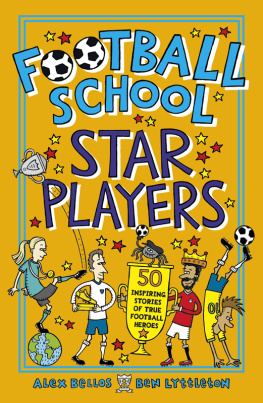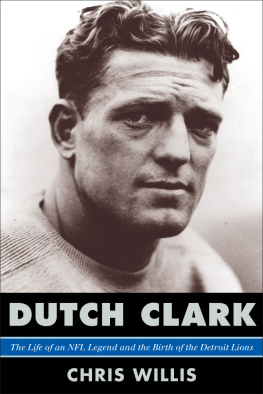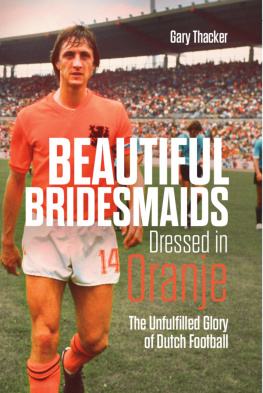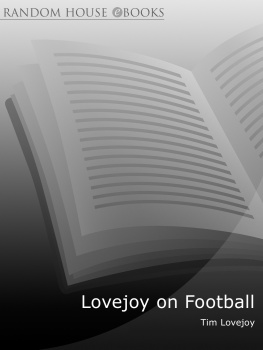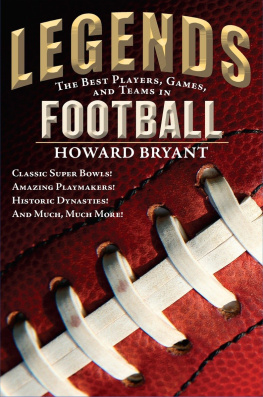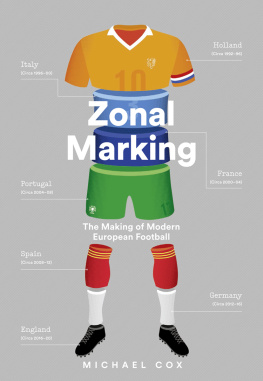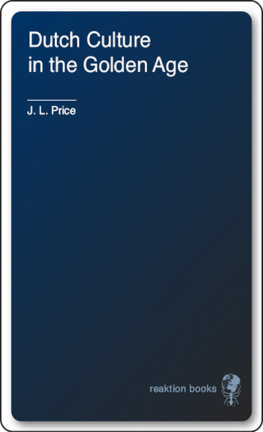David Winner - Brilliant Orange: The Neurotic Genius of Dutch Football
Here you can read online David Winner - Brilliant Orange: The Neurotic Genius of Dutch Football full text of the book (entire story) in english for free. Download pdf and epub, get meaning, cover and reviews about this ebook. year: 2000, publisher: Bloomsbury Pub Ltd, genre: Science. Description of the work, (preface) as well as reviews are available. Best literature library LitArk.com created for fans of good reading and offers a wide selection of genres:
Romance novel
Science fiction
Adventure
Detective
Science
History
Home and family
Prose
Art
Politics
Computer
Non-fiction
Religion
Business
Children
Humor
Choose a favorite category and find really read worthwhile books. Enjoy immersion in the world of imagination, feel the emotions of the characters or learn something new for yourself, make an fascinating discovery.

- Book:Brilliant Orange: The Neurotic Genius of Dutch Football
- Author:
- Publisher:Bloomsbury Pub Ltd
- Genre:
- Year:2000
- Rating:3 / 5
- Favourites:Add to favourites
- Your mark:
- 60
- 1
- 2
- 3
- 4
- 5
Brilliant Orange: The Neurotic Genius of Dutch Football: summary, description and annotation
We offer to read an annotation, description, summary or preface (depends on what the author of the book "Brilliant Orange: The Neurotic Genius of Dutch Football" wrote himself). If you haven't found the necessary information about the book — write in the comments, we will try to find it.
Brilliant Orange: The Neurotic Genius of Dutch Football — read online for free the complete book (whole text) full work
Below is the text of the book, divided by pages. System saving the place of the last page read, allows you to conveniently read the book "Brilliant Orange: The Neurotic Genius of Dutch Football" online for free, without having to search again every time where you left off. Put a bookmark, and you can go to the page where you finished reading at any time.
Font size:
Interval:
Bookmark:

First published in Great Britain in 2000
This electronic edition published in 2012 by Bloomsbury Publishing Plc
Copyright 2000 and 2010 by David Winner
The moral right of the author has been asserted
All rights reserved
You may not copy, distribute, transmit, reproduce or otherwise make available this publication (or any part of it) in any form, or by any means (including without limitation electronic, digital, optical, mechanical, photocopying, printing, recording or otherwise), without the prior written permission of the publisher. Any person who does any unauthorised act in relation to this publication may be liable to criminal prosecution and civil claims for damages
Bloomsbury Publishing Plc
50 Bedford Square
London WC1B 3DP
Bloomsbury Publishing, London, Berlin, New York and Sydney
A CIP catalogue record for this book
is available from the British Library
ISBN 9781408835777
Visit www.bloomsbury.com to find out more about our authors and their books
You will find extracts, author interviews, author events and you can sign up for newsletters to be the first to hear about our latest releases and special offers
For:
Dad, who taught me to love football, Mum, who taught me to love art and Hanny, who taught me to love Holland.
In the spirit of Total Football, chapter numbers are not sequential think of them instead as squad numbers.
If this is a book about Dutch football, at some stage youll probably wonder why it contains pages and pages about art and architects, cows and canals, anarchists, church painters, rabbis and airports, but barely a word, for example, about PSV and Feyenoord. A very fair point. And the reason, I suppose, is that this is not so much a book about Dutch football as a book about the idea of Dutch football, which is something slightly different. More than that, its about my idea of the idea of Dutch football, which is something else again.
Ever since I was a small child, Ive had the feeling there was something special and great about the Dutch. I was offered one possible reason for this when I went to look at an apartment in the Rivierenbuurt district of Amsterdam last year. My prospective landlady turned out to be a bit of a psychic, and informed me I had had a past life or lives there. Dont you recognise any of this? Well, no, actually but she might be right. A more straightforward explanation is that when I was about six my sister and I were looked after by a Dutch au pair called Hanny. She was warm and fun and wonderful and I formed the impression (which I now understand may not be 100 per cent true in every case) that all Dutch people must be warm and fun and wonderful. They certainly all had to be very brave, living as they did below the sea and protected at times only by a small boy with his finger in a dike.
The first time I heard of Ajax was in 1971, when I was fourteen. The team, apparently named after a brand of scouring powder, played Panathinaikos in the European Cup final at Wembley, and a Greek school friend who went to support the Athens club came back awed. We didnt have a chance, he said. That Cruyff! God, hes good. The next year my club, Arsenal, met Ajax in the European Cup. During the build-up to the first game in Amsterdam, the British press was full of stories about this strange-sounding wonder-team and their star player, who sounded quite a lot better than George Best. Such games werent televised live, but no pictures could have impressed me more than the BBCs radio commentary by Maurice Edelstone, who marvelled at the billiard-table perfection of the Olympic Stadium pitch and made it clear that Arsenal were up against a team infinitely more sophisticated and skilful than their own. In the return leg, on the mud-patch that was Highbury, Arsenal barely got to touch the ball, and Cruyff and co seemed to be playing a different game entirely.
Ajaxs final against Inter Milan in Rotterdam a couple of months later was carried live on TV, and by then I was hooked. Ajax played with a gorgeous, hyper-intelligent swagger. They ran and passed the ball in strange, beguiling ways, and flowed in exquisite, intricate, mesmerising patterns around the pitch. They won 2-0 but it could have been five or six. Ajax were like beings from a quite different, more advanced football civilisation. They were warm and fun to watch. They were clearly wonderful.
A year later I visited Amsterdam for the first time (in this lifetime, anyway), it being the final stop of a month-long InterRail trip round Europe with my best friends, Nick and Trevor. We slept of course in the Vondelpark, which was full of bedraggled, dopey hippies and thus deeply cool. (This was 1973, after all.) In a restaurant on the Rokin we employed a favourite scam, involving the three of us ordering a single Coke and then scavenging left-over food from the plates of other tourists as they left. I for one had much more important things to do with my few remaining pounds: I was desperate to buy an Ajax shirt. When I asked a policeman for directions, he sweetly drove us in his patrol car to a sports shop on the other side of the city. I mentioned I was a fan of Arsenal, thinking he might have heard of them. The policeman shook his head and shrugged his shoulders. Who?
At around this time the great Ajax team seemed, for obscure reasons, to break up, but for the 1974 World Cup a year or so later the players got back together and swapped their fancy white and red shirts for orange ones. They were even better now, not least because the slow-moving Feyenoord star Van Hanegem was part of the team. The Total Football the Dutch played that month in Germany was extraordinary. How could anyone have imagined and executed something so dazzling? I adored the Dutch team for both the spectacle they provided on the field and their air of relaxed wisdom and sophistication off it. They apparently stood for some cultural ideal, though what that was I wasnt sure. And they were so smart. When Rinus Michels or Johan Cruyff, Arie Haan or Ruud Krol appeared on English television or in newspaper interviews, they were always fluent and fascinating. They spoke intelligently in several languages, while English players struggled with one. The Dutch all seemed so very whats the word? Dutch.
Somehow Holland lost the final to West Germany. Just as the appeal of Romeo and Juliet lies in its lovers not living happily ever after, so Im sure my obsession with Dutch football would run less deep were it not for that defeat. The Dutch had come close, but missed the great prize. Also my fascination was based mainly on what I saw on TV, which produces its own distortions. Over the years as other Dutch teams came and went all generally following the model of the great Ajax and the class of 74 playing their singularly Dutch style and developing a weird habit of blowing important matches, I adopted them in the way football fans do. I came to know the Dutch and their footballers better and love them more. In idle moments I fell to wondering what made the teams tick. What made them the way they were? What was Dutch about them? When they played beautifully, what exactly were they doing? Why did Dutch football look so different from everyone elses football? Why did they so often screw up at the vital moment in the biggest competitions? In the 1990s I started trying to teach myself Dutch in order to find out what the Netherlanders said to themselves about their football. I saw Hollands football as a mirror to and the most interesting expression of its culture. I began to write occasional pieces of journalism about it. The more I researched, the more I understood, but also the more I was confused. With my cousins Dutch husband, in 1997 I got the chance to translate Frits Barend and Henk van Dorps collection of interviews with Johan Cruyff. The key personality of the phenomenon of Dutch football, Cruyff spoke not in grand philosophical sweeps but in brilliant details and riddles. Every disadvantage has its advantage, The game always begins afterwards, If I wanted you to understand it, I would have explained it better
Font size:
Interval:
Bookmark:
Similar books «Brilliant Orange: The Neurotic Genius of Dutch Football»
Look at similar books to Brilliant Orange: The Neurotic Genius of Dutch Football. We have selected literature similar in name and meaning in the hope of providing readers with more options to find new, interesting, not yet read works.
Discussion, reviews of the book Brilliant Orange: The Neurotic Genius of Dutch Football and just readers' own opinions. Leave your comments, write what you think about the work, its meaning or the main characters. Specify what exactly you liked and what you didn't like, and why you think so.

